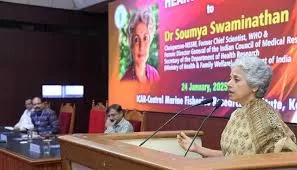Soumya Swaminathan highlights major challenges, from climate change to dietary risks, at research event in Kerala
Kerala, January 25, 2025 — Amid rising global health threats, former Chief Scientist of the World Health Organisation (WHO), Dr. Soumya Swaminathan, identified zoonotic infections as a significant concern to human health. These infections, which are transmitted from animals to humans, have become a growing threat in the wake of climate change and antimicrobial resistance.
Dr. Swaminathan, speaking at the launch of a research project focusing on the water quality assessment of Vembanad Lake and the study of waterborne infectious diseases at the ICAR-Central Marine Fisheries Research Institute (CMFRI), emphasized the importance of integrated research in addressing these emerging health challenges.
“Most of the health threats today originate from environmental factors,” Dr. Swaminathan explained. “To predict and prevent future outbreaks, we must integrate data from weather, climate, health, and environmental sources.” She highlighted the need for a dedicated Environmental Health Regulatory Agency in India to safeguard against the increasing risks posed by environmental degradation.
In addition to zoonotic infections, Dr. Swaminathan pointed to dietary risks as the leading health concern in India. “Half of Indians cannot afford a nutritionally sufficient healthy diet,” she said, urging a more comprehensive approach to addressing nutritional deficiencies. Kerala and Tamil Nadu, she noted, are seeing a worrying rise in obesity and non-communicable diseases, alongside ongoing issues like malnutrition and anaemia, all stemming from unhealthy dietary habits.
Dr. Swaminathan also called attention to the potential of marine resources to improve nutrition in the country, emphasizing that India has not yet fully harnessed these resources to address critical dietary issues.
She further discussed the profound impacts of climate change, stressing that India is one of the most vulnerable countries to climate-related hazards. “Almost the entire population of the country is being exposed to at least one climate hazard such as floods, droughts, cyclones, and extreme heat,” she said. “Heat is particularly dangerous to both physical and mental health, with the most vulnerable populations bearing the greatest burden.”
Reflecting on the unprecedented scientific achievements during the COVID-19 pandemic, Dr. Swaminathan noted the rapid development of vaccines as a testament to the power of collaboration and data-sharing among research institutions. “During my time at WHO, I saw this extraordinary level of networking,” she said. “It was a remarkable achievement facilitated by the sharing of data and prioritizing the rapid dissemination of findings over individual publication.”
However, Dr. Swaminathan also warned of the dangers of misinformation, especially in the digital age. She described how misinformation, particularly on social media, has become a significant obstacle to public health efforts. “During COVID-19, many people disguised as ‘experts’ gave advice that was not based on science, and this caused harm,” she added.
Disclaimer:
This article is based on remarks made by Dr. Soumya Swaminathan during a recent event at ICAR-CMFRI. The views and opinions expressed are those of Dr. Swaminathan and do not necessarily reflect the official position of the organizations she has been associated with. The information provided is intended for informational purposes only and should not be construed as medical advice. Always consult with a healthcare professional for advice on medical matters.












